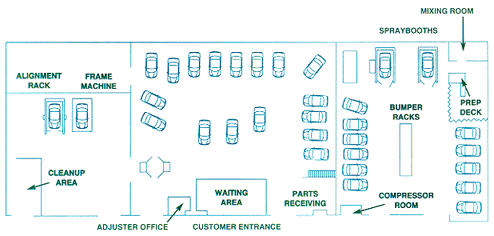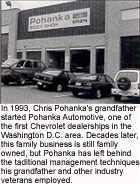In 1919, Chris Pohanka’s grandfather started Pohanka Automotive, one of the first Chevrolet dealerships in the Washington, D.C., area. Decades later – as was certainly expected – this family business is still family owned. Pohanka’s uncle took over the dealership business, and later, Pohanka, his brother and his cousin got involved.
“Our family has been in the [automotive industry] for a long time,” says Pohanka. “But we’ve always been more on the service side than the sales side. That direction has worked out well for us.”
Though Pohanka was born into a family with a legacy of automotive sales and service, the direction he’s taken the three Virginia collision shops he owns has few ties to the past. Adopting management techniques he’s learned from other shop owners and business development groups, Pohanka has established repair teams and empowered his employees by giving them responsibility, listening to them and then implementing their ideas.

There’s No “I” in Team
A few years ago, a couple valued technicians came to Pohanka with a dilemma. They were tired of being collision repair techs and wanted to start their own shops. Well-aware of the difficulty in finding technicians, Pohanka decided to delve into the situation rather than wish the techs well and send them on their way.
“They wanted to get out of ‘turning wrenches,’ ” says Pohanka. “I told them it would take a lot of money to start their own shop and that it didn’t guarantee they wouldn’t be turning wrenches.”
While brainstorming ways to correct the situation, Pohanka remembered a fellow Virginia shop owner who had an assembly-line process set up in his shop. He discussed the idea with his two techs and, together, they decided to establish repair teams within the shop. “That way, you’ve got the right guys doing the right job,” says Pohanka. “A guys who’s been a body man for 10 or 15 years shouldn’t be prepping a bumper or de-trimming a car.” And at Pohanka’s three shops, they aren’t.
Not only did the solution satisfy Pohanka’s two troubled techs, but other techs have since gotten involved. At the Chantilly, Va., shop, Pohanka has established four teams with four technicians each. Two of the team leaders are the same two techs who approached him ready to leave the shop.
In addition to helping retain two valued techs, the team concept has increased morale, production and efficiency because the right people are doing the right job. They’re also working together rather than as individuals.
On one team, for example, the team leader is a tech who’s very organized. Pohanka also assigned to the team:
- A technician helper who was capable of quality work but couldn’t organize his paperwork. With his skills, the leader was able to take over the paperwork, which allowed the helper to focus on what he did best: repair cars.
- A technician who used to be a painter and later worked in the front office of a shop. He took over doing all the supplements because that was his strength.
- One of the best techs Pohanka has ever employed, but who only liked to take on two or three jobs at a time because when he got stuck on a project, he’d lose concentration on everything else, says Pohanka. He needed someone who could organize his work, which is what the team leader has been able to do.
“Using the team concept, we promote apprentices to helpers to technicians, so they never really leave the team,” says Pohanka. “At each level, they’re doing what they should be doing all day and if they need help, they’ve got the team to back them up.”
Empowering Employees
A few years ago, Pohanka enrolled his employees in a Saturn training course. The philosophy taught: Turn the organizational chart upside down so the top level guys aren’t making the decisions; the people on the floor are.

Tossing a few management history books out the window, Pohanka – and his employees – grabbed hold of the concept and started flipping.
“If [my employees] don’t think our policies make sense, I want them to tell me,” says Pohanka. “I can only make decisions based on three things: what I see, what I hear and what’s in the numbers. So their input is important in resolving any issue.”
On a regular basis, Pohanka’s techs come to him not only with situations that need addressed, but solutions for resolving them. “Involving them in the decision making process makes me more of a facilitator,” he says. “That’s been a key to our success.”
Pohanka’s empowerment strategy has worked so well that he’s now looking to start another shop. Since the managers in charge at his three shops are doing a “great job,” Pohanka has the time to pursue another venture.
“My employees are empowered to make the decisions and are responsible for the outcome,” he says. “We communicate, and that allows me to involve myself in only a couple key things on a daily basis and makes my job easy.”
Feedback
Busy re-writing the history of his shops, Pohanka has left behind the traditional management techniques his grandfather and other industry veterans employed. “The basis for our success is communicating and getting feedback from employees,” he says.
That feedback was the key in overcoming a recent issue: getting techs to come to work. As an incentive, Pohanka told them he’d pay a bonus at the end of the year to all the techs who hadn’t missed any days other than vacation.
His techs thought it was a reasonable deal, but offered their own suggestion. Rather than basing the bonus on time, they wanted it based on goals. If a team hit its objective, say 300 hours a week, for the entire year, they received a bonus. That way, if production was up, they could take additional time off and not be penalized.
Happy with the suggestion, Pohanka agreed. “It’s a better deal for them and a better deal for me because they’re rewarded by doing what I’m asking them to do,” says Pohanka. “It makes sense, and it’s better than what I came up with because the idea was theirs.”
Working Together
Though his family has owned dealerships and automotive service centers for more than 80 years, Pohanka doesn’t profess to know the technical side of the collision repair business. Instead, he relies on his techs. “If I trust them and respect them, then it will come back to me,” he says. “And it has.”
That mutual respect has led to increased efficiency and production and boosted employee morale.
Not one to be narrowminded, Pohanka also puts his trust in people outside his network of shops to improve his business. “I clearly don’t know everything,” he says. “But if I can get bits and pieces of what other people are doing and bring them back to the shop where they make sense, then I’ll do it.
“If we’ve got an area we’ve got a shortcoming on, I want to do everything possible to overcome it.”
Writer Melissa McGee is managing editor of BodyShop Business.
|
Equipped for Success
|
|
Sorry, We’re Closed
The Pohanka Body Shop in Chantilly, Va., used to be open on Saturdays – and everybody hated it. |













